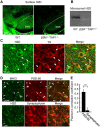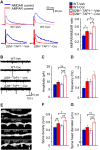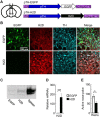MHC class I in dopaminergic neurons suppresses relapse to reward seeking
- PMID: 29546241
- PMCID: PMC5851664
- DOI: 10.1126/sciadv.aap7388
MHC class I in dopaminergic neurons suppresses relapse to reward seeking
Abstract
Major histocompatibility complex class I (MHCI) is an important immune protein that is expressed in various brain regions, with its deficiency leading to extensive synaptic transmission that results in learning and memory deficits. Although MHCI is highly expressed in dopaminergic neurons, its role in these neurons has not been examined. We show that MHCI expressed in dopaminergic neurons plays a key role in suppressing reward-seeking behavior. In wild-type mice, cocaine self-administration caused persistent reduction of MHCI specifically in dopaminergic neurons, which was accompanied by enhanced glutamatergic synaptic transmission and relapse to cocaine seeking. Functional MHCI knockout promoted this addictive phenotype for cocaine and a natural reward, namely, sucrose. In contrast, wild-type mice overexpressing a major MHCI gene (H2D) in dopaminergic neurons showed suppressed cocaine seeking. These results show that persistent cocaine-induced reduction of MHCI in dopaminergic neurons is necessary for relapse to cocaine seeking.
Figures





References
-
- Ljunggren H. G., Van Kaer L., Sabatine M. S., Auchincloss H. Jr, Tonegawa S., Ploegh H. L., MHC class I expression and CD8+ T cell development in TAP1/beta 2-microglobulin double mutant mice. Int. Immunol. 7, 975–984 (1995). - PubMed
-
- Corriveau R. A., Huh G. S., Shatz C. J., Regulation of class I MHC gene expression in the developing and mature CNS by neural activity. Neuron 21, 505–520 (1998). - PubMed
Publication types
MeSH terms
Substances
LinkOut - more resources
Full Text Sources
Other Literature Sources
Molecular Biology Databases
Research Materials

